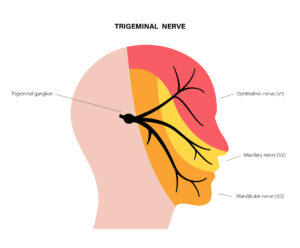Jaw Pain After An Auto Accident
 While neck pain is one of the most common complaints with an auto accident, many patients report pain in the jaw after an auto accident.
While neck pain is one of the most common complaints with an auto accident, many patients report pain in the jaw after an auto accident.
Depending upon the research reviewed, it is estimated that 1 in three to one in 4 whiplash injured patients will develop pain in the jaw. Located just in front of the ear is the temporomandibular joint or TMJ. When injured in an auto accident and the resulting pain and dysfunction, it is then referred to as temporomandibular disorder or TMD.
Pain in the jaw after an auto accident that is related to TMD can be experienced directly in the joint (immediately in front of the ear) (1), the muscles along the side of the head, called the masseters or the muscles along the side of the lower jaw. Other symptoms that can be experienced with TMD include a clicking, grinding, or locking when opening and closing the mouth. Others experience painful and limited motion of the jaw with opening and closing as well as chewing.
Pain in the jaw after an auto accident can develop immediately, or progressively develop over a couple of months. It is estimated that one in three will have a delayed development of TMD. Research demonstrates that there was a higher incident of TMD with those who were experiencing chronic whiplash symptoms (2). Interestingly, it is also noted that women are more susceptible to developing TMD issues after an auto accident. (2)
Treatment
 Treating pain in the jaw after an auto accident can be a challenge. Typical medical treatment of splints and exercises have been shown to only be about 48% effective. (3) An often overlooked contributing factor is the upper neck. Without going too much into neuroanatomy, nerves from the upper neck reflex to the trigeminal nuclei in the brain stem. This structure is the source of the trigeminal nerve, which is the 5th cranial nerve. This nerve is responsible for the sensation of different parts of the face, and some movements of the head, jaw and nasal cavity.
Treating pain in the jaw after an auto accident can be a challenge. Typical medical treatment of splints and exercises have been shown to only be about 48% effective. (3) An often overlooked contributing factor is the upper neck. Without going too much into neuroanatomy, nerves from the upper neck reflex to the trigeminal nuclei in the brain stem. This structure is the source of the trigeminal nerve, which is the 5th cranial nerve. This nerve is responsible for the sensation of different parts of the face, and some movements of the head, jaw and nasal cavity.
Now, I’ve said all the above to get to this point. If there is injury to the joints in the upper neck, the nerves will send abnormal or irritated signals to the trigeminal nuclei. Which in turn will not send abnormal signals to the side of the face and cause the jaw muscles to work incorrectly. This can result in chronic pain and dysfunction of the TMJ. This problem is where chiropractic care comes in.
Specific chiropractic adjustments can work to correct the damage to the joints in the neck, resulting in establishing normal nerve messages and reduced dysfunction of the TMJ.
If you are experiencing pain in the jaw after an auto accident, call our office today and schedule an appointment. Dr. Schmaltz has years of treating victims of auto accidents. Call (314) 731-4383
1. Salé, Hanna and Annika Isberg. “Delayed temporomandibular joint pain and dysfunction induced by whiplash trauma: a controlled prospective study.” Journal of the American Dental Association 138 8 (2007): 1084-91 .
- 2. Häggman-Henrikson, B., Rezvani, M. and List, T. (2014), Prevalence of whiplash trauma in TMD patients: a systematic review. J Oral Rehabil, 41: 59-68. https://doi.org/10.1111/joor.12123
- 3. Temporomandibular Disorder Pain After Whiplash Trauma: A Systematic Review Birgitta Haggman-Henrikson, Thomas List, Hans Westergren, Susanna Axelsson Occupational Therapy and Occupational Science, Rehabilitation medicine
